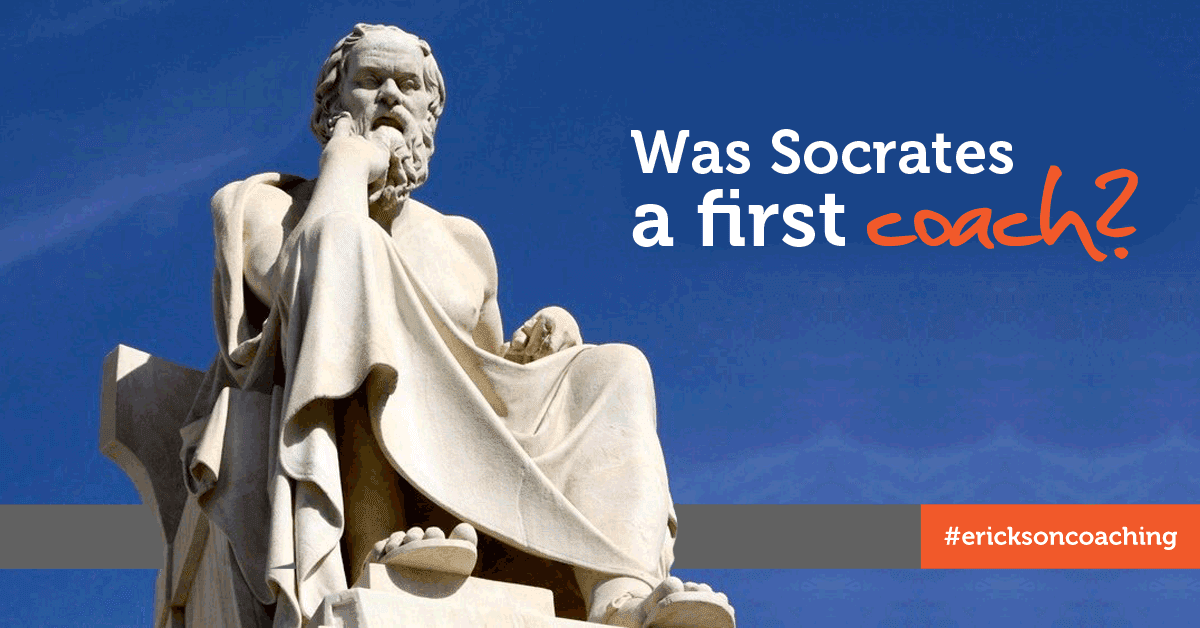
The ancient Greek philosophers were preoccupied with investigation into the reasons for human existence and the way people should live to that they could be consistent with their reason for being.
Today, most of their views seem to have lost nothing of their popularity and stand out like shining beacons, especially now that the western world is desperately seeking answers in its quest to relight its fires!
In today’s blog, we are discussing the principles and practices that Aristotle and Socrates left behind for generations to come, with the intention of proving that their principles are aligned with those of coaching. In addition, we will try to prove that Socrates was the first coach ever!
- According to Aristotle, true happiness is achieved when people develop and leverage all their capabilities.
The discovery, development and leveraging of our skills and potential is the primary aim of coaching. - Our life goal is the pursuit of well-being through practicing and developing virtues; Virtues are our values and models of behavior. Excellence (aristia) refers to the virtuous person who discovers and explores his/her capabilities (his/her self-truth) and practices moderation; moderation is the avoidance of all excess, extravagance and scarcity. Excellence, for Aristotle, has to do with more action and not pursuit of perfection.
A coach supports others to focus on achieving a personality compatible with one’s genuine aims, thus leading to a happy life. - According to Aristotle, phronesis (prudence, forethought) is a virtue of one seeking essential knowledge and its implementation, i.e. action.
Your coach supports you in changing your life and behaviours (the way you want) in order for you to live with integrity; for this to happen, you have to start taking action. - Socrates is the first Greek philosopher who investigated human nature and the soul.
The science of coaching puts the humans and their behavior at its center. - Socrates places the quest for truth, which man has buried deep inside him, at the center of his philosophy,
exactly the same way coaching does. - For Socrates, self-awareness is a fundamental value,
just like in coaching one of the most important results is creating awareness. Every professional coach has to have the competency “Evokes Awareness”, which is one of the ICF Core Competencies. - Socrates discovers truth through dialogue. This Socratic dialectic method is called “midwifing” because it helps people give birth to the truth – by discovering it for themselves. Socrates’ mother was a midwife and Socrates used to compare his art of discussion with a midwife’s art. The midwife is not the one who gives birth to the child, rather the mother does.
Coaching is mainly the search for truth through dialogue. By asking questions and listening a coach supports you to find your truth and to discover yourself. - Socrates aimed to discover people’s limits and question the assumptions on which they built their lives.
Coaching helps the individual to discover their limits and reposition themselves on a new, more truthful foundation. - Socrates did not teach, he listened. He made his interlocutors discern on their own the flaws and weaknesses of reasoning.
A coach does the same. - Socrates believed that philosophers had to see beyond the obvious.
Coaches hold the same view and skills. - Through his agonizing death, Socrates provided a valuable lesson. Every individual should accept responsibility for their own actions.
A coach is aware of the fact that the coachee is solely responsible for his/her actions and their consequences, and by asking questions he/she supports the coachee to be accountable for them also through time. - Socrates believed that every human should live with integrity, according to their own true capabilities and desires.
A coach believes that the best incentive for people to perform at their best is for them to discover what are their core values and what truly satisfies them.
Ancient Greek philosophy regarding why and how we live concentrates on the following. Why: our quest for “well-being”, for a flourishing life (eudaimonia). How: aiming for “excellence” (aristia).
Finally, both ancient Greek philosophers and modern coaches seek “excellence” (aristia) within us, not as a homogenous reality but as areti (virtue) unique to every individual.
Learn more about coaching in our previous blogs: